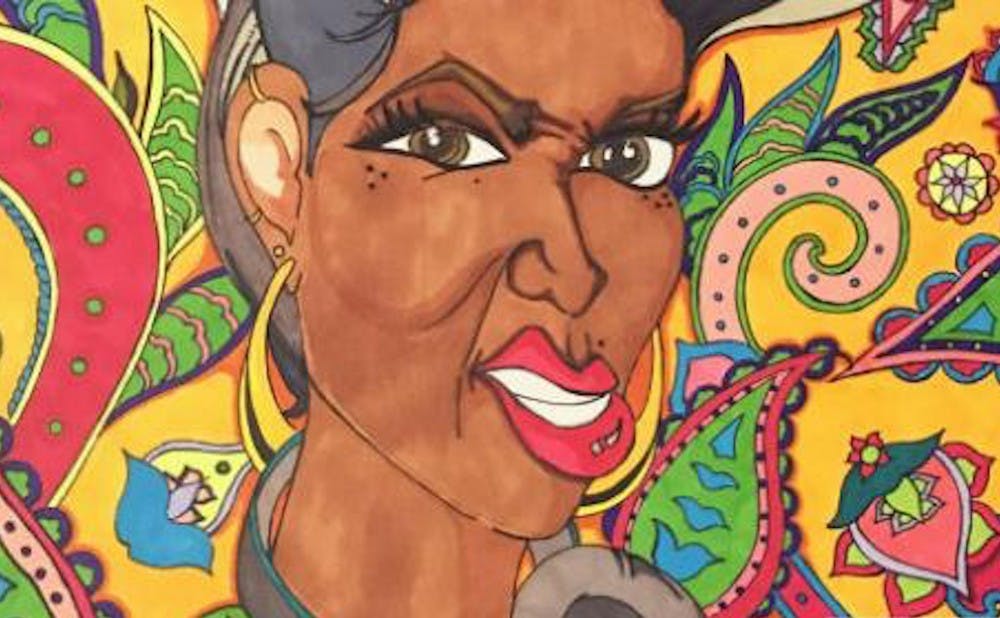This week, the Jameson Gallery in Friedl Building will welcome visual artist Natasha Powell Walker to talk about her exhibit “#SexyNotSilent.” The event will start Thursday at 5:30 p.m. and is sponsored by the Duke Council on Race and Ethnicity and the African and African American Studies department.
Known in the visual arts industry as Edith Grey, which is her grandmother’s maiden name, Walker is a self-taught visual artist who has been creating art for as long as she can remember. She graduated from Virginia Tech with a degree in Apparel Design and Merchandising Management, and her work generally centers around the contemporary experience of womanhood.
“This series in particular talks about the complexities of what we deal with as women and how that affects us emotionally,” Walker said. “So, for example, we might have to behave one way at work or in the corporate office, even sometimes through college, to try and match our male counterparts ... and we act another way when we come home to take care of our family and our loved ones.”
This dichotomy of expected roles is what working women today constantly have to reconcile. If they do not juggle the balance perfectly well or if they decide to devote more energy to one setting instead of the other, they can easily be judged as “too weak” or “too cutthroat”. This struggle is due to the gender norms still present in our society, under whose reign women are still forced to mold into the expectations placed upon them. The norms dictate what women can and cannot do and draw the line of what counts as “doing too much of one thing,” even though the evidence is everywhere that women have the potential to achieve all they want to achieve.
More specifically, the exhibit addresses black women’s struggle to discover and define their beauty and sexiness, especially with society’s mainstream beauty standards and the portrayal of what is beautiful and sexy by predominantly white female models.
“It’s becoming the era of body shaping too. We as real women who aren’t photoshopped, we look at ourselves and compare ourselves to something that isn’t real,” Walker said. “One of the things I want to do with the exhibit is to take back that power, to make us feel good about ourselves, you know, to feel our own worth. We are good enough as we are — that’s what actually makes us sexy. The things that we’ve struggled through: the physical struggle, a systemic struggle through corporate male power and educational institution, or a mental struggle ... The fact that we can overcome that — that’s what makes us sexy.”
Shining with vivid colors and bold facial expressions, the different women depicted in Walker’s paintings truly convey a brand-new definition of “sexy.” She can be playful or serious, sassy or shy, loud or quiet. She can wear a lot or just a little. She can decide to stay in and read all day or go out and party all night. But she is herself, and always sexy in her own way.
However, being a woman in the male-dominated art and media industry might be even more difficult, and Walker has faced such discrimination during her career too. One time she was asked by a man if she had been taken seriously as an artist because she was physically attractive; other times, she was considered incompetent for the job because she was a woman and had to prove herself against doubts from men who would prefer to choose from their “boys club.” Things have been like this for decades, but thanks in part to recent Hollywood sexual misconduct scandals and Oprah Winfrey’s viral Golden Globes speech, women have finally ripped a hole in the silence and started a conversation about inequality, through which hopefully more people, women and men alike, will be inspired to join the battle.
Now that the spotlight is on, Walker suggested that all women stay strong, stay together to make big changes, and advocate for and support each other along the way. We might still have a long way to go, but times are changing, and collectively women will bring about major impacts.
It is worth noting that Duke, unfortunately, is not free from gender inequality, for our future female engineers, doctors, lawyers, artists, scientists, policy makers and businesswomen also face societal pressure; the industries they are about to enter are dominated by males. Moreover, not only are women at Duke expected to be smart, but also pretty, athletic, outgoing, involved in clubs, manage a fun and aesthetically pleasing Instagram account, post crazy party snapchat stories and go out four times a week — but still get straight A’s on midterms.
No women have to follow any rules like the above. You are sexy. And you will not be silent or silenced.
Get The Chronicle straight to your inbox
Signup for our weekly newsletter. Cancel at any time.

